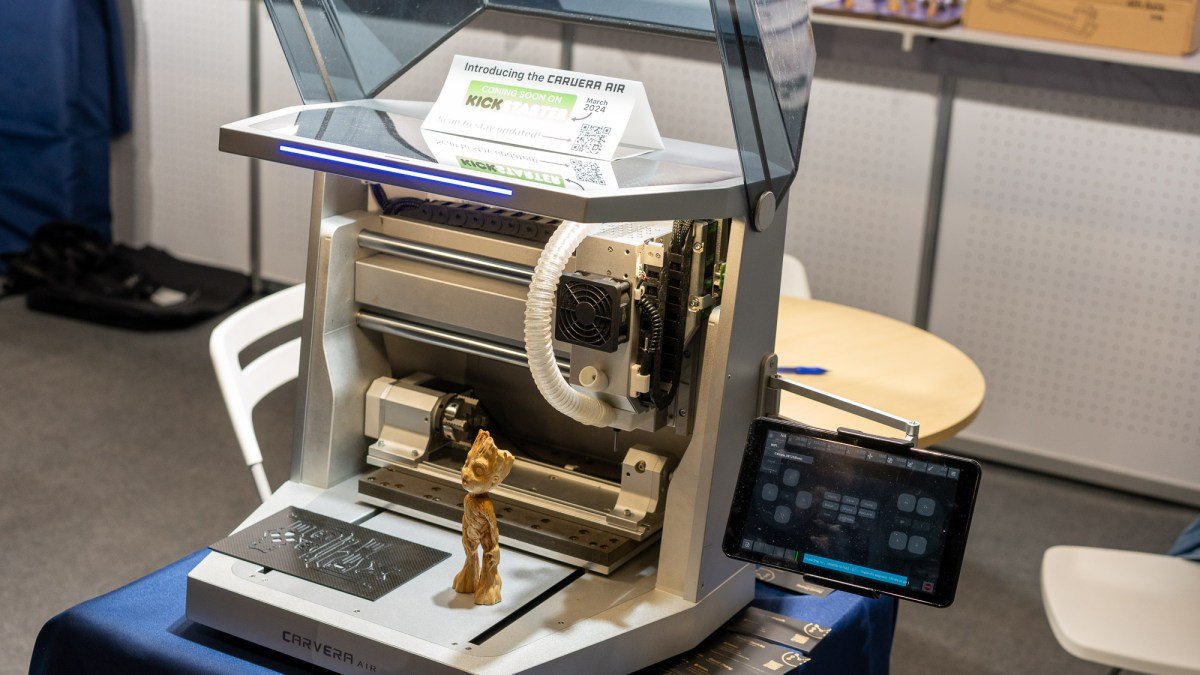Innovative Education With Makera’s Carvera and Carvera Air
In the depths of the pandemic, a revolutionary idea emerged through Makera’s Kickstarter campaign for the Carvera – a fully automatic desktop CNC machine. With the help of 500 backers, their goal was reached, and an additional 2,500 machines were sold. However, with a price tag of $6,000, the company soon realized the potential for a more accessible option.
At CES in Las Vegas, Makera unveiled the Carvera Air – the little brother of the Carvera. With a similar workspace but fewer features, the Makera Air is a perfect option for those looking to learn the basics of CNC manufacturing. According to Jason Erdreich, Makera’s education director, “The Makera Air can machine any type of material with ease – from epoxy and plastics to soft metals like aluminum.”
Erdreich goes on to explain some of the innovative features of the Makera Air, stating, “It may not have an automatic tool changer, but it does come with a unique tool changing process. With just the movement of a lever and a lock, tools can be easily changed without the use of wrenches. And like the Carvera, it is fully compatible with a fourth-axis module and an optional laser engraver.”
While Makera may have a similar industry rival, Coast Runner, their focus and capabilities set them apart. Erdreich explains, “Coast Runner may have the ability to cut harder materials like steel and titanium, but we are focused on a different goal – education.”
Makera’s innovative educational platform provides students with the tools and resources to discover the exciting world of technology creation. From coding and robotics to 3D modeling and digital fabrication, Makera empowers students to become lifelong learners, problem solvers, and innovators in the rapidly evolving digital world.
“Education is more than just imparting knowledge, it’s about empowering students to become the creators of tomorrow,” shares Erdreich in an interview with TechCrunch. “Technology is not just about consuming information, it’s about building, creating, and solving real-world problems.”
As an educator himself, Erdreich understands the importance of hands-on experience for students. He recalls the excitement and pride in his students as they see their own creations come to life – whether it be a robot navigating a maze, a code snippet solving a complex problem, or a 3D model turning into a physical object.
Despite the challenges of implementing such an innovative approach to education, Erdreich remains undeterred. He acknowledges that change can be difficult, especially in the traditional field of education, but he is confident that Makera’s approach is necessary in the face of the digital era.
Erdreich emphasizes the importance of equipping students with the skills to create technology, preparing them for a future where these skills will be in high demand. “Technology is the future,” he asserts, “and the future needs creators, not just consumers.”
Makera has a clear vision for the future and is continuously expanding their offerings, reaching more students, and improving their platform based on user feedback. As for pricing, the Carvera Air will have a final price tag “under $2,000” with plans to start the Kickstarter campaign at “as close to $1,000 as possible.” The company hopes to launch the campaign in March, with deliveries starting later in the year.
Makera’s commitment to innovative education is evident in their focus on empowering the next generation of tech creators. By providing students with the skills and resources to shape the future, one block of Delrin at a time, they are leading the charge in a rapidly evolving tech landscape.
“That’s the most exciting part,” concludes Erdreich, reflecting on the impact of Makera’s approach to education.








